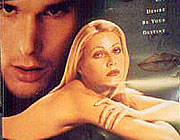|
|
|
|
Great
Expectations
|
 |
|
In a remarkably prescient essay published over fifty years ago, the great film critic André Bazin pilloried the aspiration towards faithful screen adaptations of literary classics. It is a folly, Bazin argued, to assume that certain archetypal stories are wedded once and for all to the language and viewpoint of the authors who first gave them flesh – even if those authors include Flaubert, Dostoevsky and Hardy. Pop culture, in Bazin's view, creates a new Middle Ages: famous events and characters from novels quickly transcend their original source and become suitable raw material for all artists and storytellers, high or low. The latest version of Charles Dickens' Great Expectations – a very free, devil-may-care modernisation – is a pop artefact through and through. It takes a while to adjust to the heightened, artificial, patently unreal air of this film. From the first moments, it mixes fleeting, MTV-style imagery with a voice-over narration by Finnegan (Ethan Hawke) that earnestly stresses the dazzling ephemerality of all personal experience. This adaptation whips us frenetically from one neo-Dickensian tableau to another: from young Finnegan's discovery of the angry criminal Lustig (Robert De Niro) hiding in water, to endless days of dancing and flirting with the dotty Ms Dinsmoor (Anne Bancroft) and the budding femme fatale Estella (Gwyneth Paltrow). Eventually, the young adult Finnegan reaches the New York art world and embarks upon a fabulous career as a neo-naive, quick-sketch artist – an itinerary which, despite a supply of sketches and paintings from the hand of Francesco Clemente, resembles no success story ever written up in Artforum. More taxing for Finnegan is his recurring problem in getting a grip on the elusive Estella – and squaring his new, glamorous lifestyle with his fishing town origins, represented by his salt-of-the-earth father-figure Joe (Chris Cooper). As utterly transformed as the famous tale is, its central, affecting themes still shine through: changing histories and passing times; reversals of fortune and destiny; the presence of a certain kind of grace in a harsh world; how the dreams of youth do or do not match the vicissitudes of adult life. In this mad merry-go-round, the surprise reappearance of Lustig in Finnegan's world is particularly poignant. Director Alfonso Cuarón made a big impression on me with his intense, quite underrated film for children, A Little Princess (1995). Indeed, apart from a few bouts of swearing, his Great Expectations could also pass as a florid fairytale for kids. Cuarón's favourite theme as an artist is already apparent: his heroes and heroines seem eternally young, plunged into a tormenting confusion as to the identity and motives of their real parents or benefactors – and they struggle to find a rite of passage into the scary, adult world. The French writer-director André Téchiné composed an even freer and scarier variation on Dickens' story in his Le Lieu de crime (The Scene of the Crime, 1986) with Catherine Deneuve – exploring Freudian undertones that Cuarón chooses to breezily skip by. Nonetheless, this Great Expectations – despite its rather relentless insistence on high-style and dizzy euphoria – is a disarming and original work, and one of the real curiosities of the late '90s. MORE Cuarón: Y Tu Mamá Tambíen, Fallen Angels © Adrian Martin March 1998 |
![]()